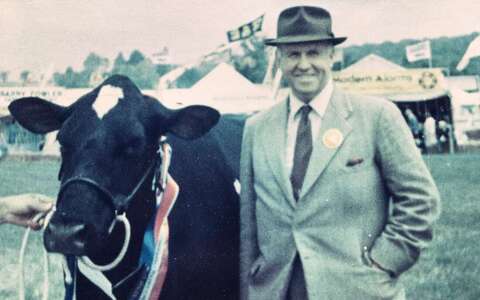
Many will find this statement baffling as the butterfat content of milk is no longer valued. Indeed today cattle are genetically bred to produce less butterfat, not more.
Following on from my column a few weeks ago, it is worth noting that this exceptional Friesian cow, died just weeks before her 21st birthday. I wonder how many 20 year old cows can be found in today’s dairy herds.
John Lindley who farmed in Somerset, sold his dairy herd in 1990, turning his attention to building up his existing Simental beef herd. He served as chairman or president of numerous farming and cattle associations and councils.
It is good news that a new report from the All-Party Group for Animal Welfare, recommends the need for small abattoirs to receive financial assistance under any future agricultural support system, through amendments to the Agriculture Bill.
MP’s believe that most welfare problems associated with the farm-to-slaughterhouse supply chain occur during transport. However, the concern of farmers is also if our local small abattoirs close down, livestock would have to travel long distances.
The plight of small abattoirs has been brought into sharp focus over the past few years. As of April 2020, there are just 62 remaining, 13 fewer than there were in April 2016, down from 96 in 2007, with the most recent closure taking place just two weeks ago.
The problem is compounded by the uneven distribution of abattoirs across the country, with few in the north of England where most livestock are farmed, and places like the Isle of Wight, the Isle of Skye and the Scilly Isles which have no abattoirs. Thus resulting in additional travel and expense involved in getting the animals to slaughter.
Since the coronavirus pandemic began, small abattoirs have proved to be remarkably resilient and a vital resource, having been able to increase their output when larger facilities were slashing production due to social distancing rules in the cutting rooms. Small abattoirs tend to work like a butcher, so each man will have a table and will process the whole animal.
As well as being able to provide a full service, having a diverse set of small abattoirs reduces the risk of the meat sector being brought to its knees by outbreaks of the virus in slaughterhouses.
There is a growing demand for local produce as customers want to know exactly where their meat has been reared, which is why independent butchers and farm shops have become increasingly popular.
Hopefully part of this support package for small abattoirs will enable them to upgrade their premises to AVA Certified standards, enabling the export of beef to countries such as Singapore. Currently the closest to Sussex with appropriate certification is in Scotland. Not exactly around the corner!
It is clear that 99.9% of the public have been sickened by the behaviour of those who have hijacked what were originally peaceful gatherings, due to an event which happened nearly 5,000 miles away!
The scenes of thuggery, flag burning, criminal damage, looting, desecration of War memorials, and violence towards police officers and law abiding members of the public, are wholly unacceptable. So too is the sight of police officers and politicians ‘taking the knee’, which is interpreted by the thugs as supporting this anarchy and undemocratic behaviour.
It is time to take back control of our streets, lock up the criminals, protect law abiding citizens, and treat people according to their behaviour. It is not what you say but what you do which earns respect.

 RSS Feed
RSS Feed